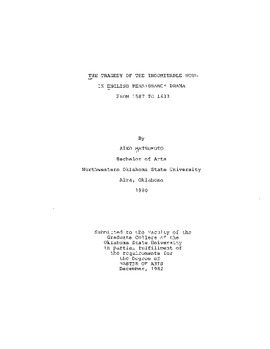| dc.contributor.advisor | Klemp, Paul J. | |
| dc.contributor.author | Matsumoto, Aiko | |
| dc.date.accessioned | 2015-08-27T16:26:04Z | |
| dc.date.available | 2015-08-27T16:26:04Z | |
| dc.date.issued | 1982-12-01 | |
| dc.identifier.uri | https://hdl.handle.net/11244/16593 | |
| dc.description.abstract | The Renaissance culture believed that man through free will strives for the infinite discerned by divinely given reason or for the finite desired by his bodily sensesi in short, he is free to choose and strives for his goal, whatever it may be. This concept is well known, and it is, I think, a significant undercurrent in English Renaissance literature. But to my knowledge few critics have studied this undercurrent or traced its changes while referring to particular works except those of Spenser, Shakespeare, and Milton. My thesis will focus on five early and late Renaissance tragedies. | |
| dc.format | application/pdf | |
| dc.language | en_US | |
| dc.publisher | Oklahoma State University | |
| dc.rights | Copyright is held by the author who has granted the Oklahoma State University Library the non-exclusive right to share this material in its institutional repository. Contact Digital Library Services at lib-dls@okstate.edu or 405-744-9161 for the permission policy on the use, reproduction or distribution of this material. | |
| dc.title | Tragedy of the Indomitable Soul in English Renaissance Drama from 1587 to 1633 | |
| dc.type | text | |
| dc.contributor.committeeMember | Berkeley, David S. | |
| dc.contributor.committeeMember | Luecke, J. | |
| osu.filename | Thesis-1982-M434t.pdf | |
| osu.accesstype | Open Access | |
| dc.description.department | English | |
| dc.type.genre | Thesis | |
